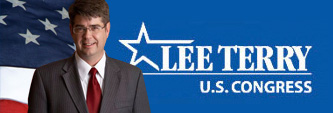Congressman Lee Terry:
A Substantial Record of Accomplishment
Lee Terry has compiled an outstanding record of service and accomplishment for the residents of Nebraska’s second district. Lee gets things done because he works hard, is respected and works well with members regardless of political party. Lee puts people first and serves the residents of the district 24/7. He’s on the job all of the time for all of his constituents. As Lee has stated, his overriding philosophy is to “Empower people, not the government”.
Bi-partisan and Respected
The Hill newspaper, a must-read publication in Washington, D.C. that covers activities on Capitol Hill, surveyed Members of Congress in 2009 to see which were considered by their peers to be the most partisan or the least partisan[1]. The confidential survey asked Democrats about Republicans and Republicans about Democrats. The result? U.S. Rep. Lee Terry was rated as one of the least partisan members of the House. Again, this according to Democratic members of the House.
National Journal, another respected and widely read publication in Washington, analyzed which Members of Congress are influential in the important area of telecommunications policy.[2] The result? They said U.S. Rep. Lee Terry was “wired” in his leadership on telecommunications issues. National Journal further credited Terry for working with a key Democrat (Rep. Rick Boucher of Virginia) in co-sponsoring legislation to “revamp the Universal Service Fund,” a matter of critical importance to less-populated states like Nebraska.[3]
Lee Terry works with colleagues on both sides of the aisle to get good things done for the people of the second district but he always stands on principle.
Cutting spending and the federal debt to create private sector jobs
Excessive federal spending and debt is crowding out private sector investment in the economy and that is one reason we have seen such a poor record nationally on creating new jobs. Lee Terry has a long record of being a “fiscal hawk” and has made the tough votes to reduce federal spending. Records from the House Clerk’s office show that in 2009, 2010 and 2011, Terry voted 157 times to cut spending on bills that were on the House floor. Had the Senate not blocked a number of the big-ticket items, Terry’s votes would mean we’d be spending $7 trillion less over ten years. The Nebraska Taxpayers for Freedom has given Lee an “A” rating when it comes to making the tough decisions to cut federal spending and debt.
Enacting Important Laws
Lee met with success in 2011 in moving his legislative initiatives forward. One bill would require the federal government to set a firm deadline for making a final decision on the XL Keystone Pipeline. The process has been overly time-consuming and bureaucratic over the past three years and Lee believes some finality should be brought to it (HR 1938). Lee pursued the issue throughout the year and took the lead in getting a provision attached to the end-of-the-year tax extension measure that requires the administration to make a decision on the Keystone project by February 2012. The bill was enacted into law. The Keystone measure would allow construction to move forward on the pipeline in all states, but would require the new Nebraska route to be approved before construction could begin here.
A second piece of legislation is Lee’s amendment to major federal flood insurance legislation that would prohibit the use of an unfair exclusion called “flood in progress”. Some homeowners have purchased flood insurance, have met any applicable waiting period but still seen their claims turned down because a bureaucrat decided any damage was caused by a flood that was in progress at the time the policy started. Lee believes this practice is patently unfair and should be stopped. The Terry amendment was adopted on the House floor and became part of the omnibus legislation (HR 1309, amendment) that went on to be enacted this past summer.
A third bill sponsored by Congressman Terry was enacted into law at the end of the prior session of Congress. Public Law 111-371 was Terry’s proposal to allocate certain radio spectrum for use by local entities who established low-power FM radio stations. This law could encourage the development of many new sources of information and entertainment on the radio in communities throughout the nation.
Important Energy Laws
As a member of the House Energy and Commerce Committee—one of the most important panels in Congress—Terry has worked tirelessly on issues as diverse as energy, health care and telecommunications.
When legislators enacted a major energy overhaul in 2007 to increase the fuel economy of cars and trucks, the effort to do so was led by U.S. Reps. Baron Hill of Indiana and Nebraska’s Terry. Their proposal, known as Hill-Terry, will save the nation from importing 401 million barrels of oil from the Persian Gulf each year.[4] The chairman of the committee at the time, U.S. Rep. John Dingell of Michigan, specifically credited the two legislators with providing “extraordinary leadership” on the issue and said they “deserve the great thanks and congratulations of this Congress” for their work on energy reforms.[5]
The “Hill-Terry” law is a major step toward energy independence and is evidence of Terry’s ability to work across the aisle and get good policies enacted. In this case with Rep. Baron Hill, a well-respected Democratic member.
In 2007, Congressman Terry won approval of a provision that requires federal facilities to determine if Geothermal Energy devices are appropriate for use in more buildings. Simply put, Geothermal Energy pumps air from beneath the earth’s surface to either cool or heat the facility depending on the outside temperature. Since the air temperature 100 feet below the surface is a consistent 60 degrees, it can be cheaper to heat or cool a building through these means. (P.L. 110-140) Also important to note is that Terry’s provision will have the residual effect of helping develop the commercial market for such systems. Finally, Terry has succeeded in winning approval for another provision in law that requires the use of E-85 (ethanol) in the federal auto fleet, a boost to domestic agricultural that helps us move to energy independence.[6]
Health and Safety Laws
Congressman Terry has won approval for a bill he played a key role in drafting that reauthorized the Poison Center program within the Department of Health and Human Services (Public Law 110-377, 2008). This innovative program has established a system of 1-800 numbers where citizens, physicians and local health professionals can call to determine whether a specific substance is poisonous and, if so, the protocols for treatment. The legislation is saving millions of dollars in healthcare costs.
Congressman Terry has been a leader in crafting legislation (P.L. 110-373, 2008) that creates a national registry for collection, review and analysis of data pertaining to ALS (Amyotrophic Lateral Sclerosis).
U.S. Rep. Lee Terry will always be proud of the fact that legislation he authored to rename a Post Office in North Omaha for the late Rev. J.C. Wade became law in 2000.[7] Rev. Wade was an outstanding individual who contributed decades of service to the community and was a moving force to expand the faith-based community in Omaha. We are a much better place because of the efforts of Rev. Wade. Still, some critics will claim that P.L. 106-340 has been the only legislation authored by Terry. That’s false and reflects a significant ignorance of how Congress really works.[8] As University of Nebraska at Omaha political science professor Randall Adkins has remarked, most Members of Congress affect legislation through committee or amendments to larger bills, and not by being the sole sponsor of a particular bill. In fact, Adkins noted that of the 10,000 bills proposed in a typical two-year period in Congress, only about 400 become law.[9] Terry’s involvement with important legislation reflects the fact that to get things done in congress, you need to know what you are doing and work on a bi-partisan basis. That’s what Lee Terry does day in and day out.
Fighting the good fight on healthcare reform and veterans services
Lee Terry has made his mark even if the legislation involved has not been enacted. A case in point is in the healthcare reform debate of 2009 and 2010. During discussion on the bill in the Energy and Commerce committee, Lee offered what many considered to be one of the major alternatives to the majority party’s proposal. When the legislation was “marked up” in the Energy and Commerce Committee—the primary committee that has jurisdiction over healthcare laws—Lee offered an amendment that would have opened the Federal Employee Health Benefit Plan (FEHBP) to all Americans, offering the public the same health benefits available to all Members of Congress. Although the amendment lost by a narrow 27-31 vote in the committee, Lee has vowed to continue the fight for healthcare reforms that empower individuals, not the government.
Another good example of legislation that remains in play is Lee’s work in the area of supporting our nation’s veterans. Lee has worked for years to change the veteran population threshold that is used to determine the location of new national cemeteries. This effort culminated in inclusion of language in an important bill in 2010 that opens the door to a VA-administered cemetery in the second district. This will provide an option to 112,000 unserved Veterans and their eligible family members. Work continues on this initiative.
Lee Terry believes very simply that a key part of the job of a U.S. Representative is to stay in close contact with his constituents, listen to them, be available for meetings and conferences on federal matters and spend as much time as possible in the district talking to individuals and families when the House is not in session. Lee has done that. Serving the people of the 2nd district is the highest honor Lee Terry could hope for—he puts people before politics and seeks a role for government that empowers individuals and families to live their lives to the fullest.
[1] “Dems’ effective one-two punch,” The Hill, May 4, 2009
[2] “Wired in Washington,” National Journal, May 20, 2009
[3] National Journal, May 20, 2009
[4] H.R. 2927, 2007
[5] Statement of U.S. Rep. John Dingell, U.S. House, during debate on H.R. 2927, 2007
[6] H.R. 3117, 2007 session incorporated within H.R. 2927
[7] Public Law 106-340, 2000.
[8] See www.ewingfornebraska.com
[9] Associated Press news article, Margery Beck, November 8, 2009







